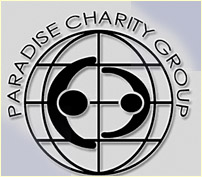Issue 16
Tara Oskooei
Toronto

Circumstance is a funny thing, really. Oftentimes we hear the word in such phrases as “…the circumstance into which one was born.” Dictionaries have described it as one’s time, place, manner, cause, or occasion. Some think of it as the external conditions that might affect one’s actions in their lives. For others, circumstance is viewed as an individual’s state of financial or material welfare.
If we consider this last monetary description it is only natural for one, especially for those privileged enough to live in first-world economies bursting with opportunities, to contrast their circumstance or material welfare with those living amongst fortunes not quite as blessed. In fact, we do not need to look very far at all across the globe to bear witness to unjust living conditions, helpless children, shelterless orphans, or pain-stricken families with no breadwinners—such conditions may even exist within our own families abroad. So why does this thin red line which ever so clearly separates the fortunate from the unfortunate, the rich from the poor, or the strong from the weak, exist? When I asked this question publicly some time ago, one response was that poverty and unjust living conditions exist for the rest of the world to bear witness to and not take for granted what they already have. Truth be told, at some point we have witnessed the misfortunes of others being used as examples to teach us to appreciate the lot that life has offered us.
This line of reasoning, however, is weak because it fails to acknowledge the humanity involved when dealing with people and the basic fact that whether we choose to accept these ‘lessons’ or not, as we speak, families are continuing to live in impoverished conditions. There are infinitely many reasons for their circumstances, and can range from political to hereditary—but are not meant for us to pass judgment upon. Furthermore, simply using the misfortunes of others as mere ‘lessons’ fails to perform the most important task of all: effect change.
The power to effect change has been given to all of us and for this reason can be considered as an equalizer. Every individual, well off or not well off, is able to positively effect change to the best of their ability both in their own and in another individual’s life. This ability to effect change is very real and can be witnessed daily. Whether it be monetary contributions to the needy, the volunteering of one’s services, or basic moral and emotional support to someone in need, these all serve as real forces that will positively effect change in someone else’s life. The fact that no contribution is more or less superior than the other serves to prove that the power to effect change is a true equalizer among our human race. The point being that even the smallest contribution of even $1.00 per day, almost the price of a chocolate bar today, can amount to $30.00 per month, which is enough to help a student in Iran pay their monthly university tuition.
Recently, I have had the opportunity to meet and be a part of a powerful charity group who themselves are fighting to effect change on a daily basis. The Paradise Charity Group is a Toronto based not-for-profit charitable foundation assisting needy Iranian children and their families who have no breadwinners. Their objectives include: paying the living expenses of poor children, paying schooling subsidy to needy students at various educational levels, and job-creation for families with no breadwinners. Their dedicated organizers have volunteered 100% of their time to their charity’s cause and the facilities from which they operate out of has been donated to the cause of this foundation. However, Paradise Charity has its doors open to all forms of donations whether it be monetary or student and adult volunteering of their time to furthering the effectiveness and cause of this foundation.
In reading about the unjust living conditions of many of the families, it became clear that while we may be divided with respect to material welfare and economic opportunities, at the end of the day we all breathe the same air and live beneath the same blue sky. Thus, it is the moral and human obligation of each of us to try and effect change to attempt to equalize the far too apparent divisions in this world.
Please do help.
For further information regarding Paradise Charity Group or to volunteer/donate please contact:
Tel: 905.482.4822
Web: www.paradisecharity.org
E-mail: info@paradisecharity.org












